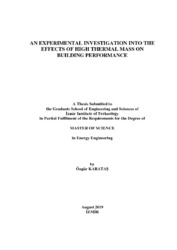Please use this identifier to cite or link to this item:
https://hdl.handle.net/11147/7360Full metadata record
| DC Field | Value | Language |
|---|---|---|
| dc.contributor.advisor | Başaran, Tahsin | - |
| dc.contributor.author | Karataş, Özgür | - |
| dc.date.accessioned | 2019-11-15T07:32:18Z | |
| dc.date.available | 2019-11-15T07:32:18Z | |
| dc.date.issued | 2019-08 | - |
| dc.identifier.citation | Karataş, Ö. (2019). An experimental investigation into the effects of high thermal mass on building performance. Unpublished master's thesis, İzmir Institute of Technology, İzmir, Turkey | en_US |
| dc.identifier.uri | https://hdl.handle.net/11147/7360 | - |
| dc.description | Thesis (Master)--Izmir Institute of Technology, Energy Engineering, Izmir, 2019 | en_US |
| dc.description | Includes bibliographical references (leaves: 59-61) | en_US |
| dc.description | Text in English; Abstract: Turkish and English | en_US |
| dc.description.abstract | The focus on energy efficiency in buildings has contributed to the increased interest in vernacular architecture using locally available materials. Monotype architecture has spread across Anatolia during last century despite builders having centuries of knowledge of vernacular dwelling. Climatic conditions are specific to geographical locations, therefore the architectural solutions respecting climatic conditions are also specific. Local construction materials are in harmony with the surroundings because they have previously been part of the current environment. The main aim of this thesis is to investigate and simulate the effects of high thermal mass on the thermal environment of cave dwellings. The case study was undertaken in a cave dwelling carved out of a fairy chimney in Ürgüp, Cappadocia. Data loggers were placed in the dwelling to observe the annual temperature and relative humidity fluctuations. Measurements showed that the interior temperature fluctuated around 18°C in January and 20°C in July, and the relative humidity fluctuated around 70% in January and 65% in July. These measurements showed that the interior conditions were thermally comfortable as a result of the high thermal mass of the cave dwelling. DesignBuilder software was used to simulate the thermal behaviour of the cave dwelling. The thermal conductivity, specific heat and density of the main material, volcanic tuff rock, were measured and defined in DesignBuilder. After defining all the inputs and boundary conditions, the numerical results obtained from the DesignBuilder provided thermal outputs which agreed with the experimental results. | en_US |
| dc.description.abstract | Binalarda enerjinin etkin ve verimli kullanımının ön plana çıkması; geçmişten gelen sürdürülebilir yerel mimari birikimine ve yerel maleme kullanımına olan ilginin artmasına yol açmıştır. Anadoluda birçok yerel mimari örnekleri olmasına karşın son yüzyılda tek tip mimari yayılmıştır. İklim koşulları lokasyona özgüdür, iklim koşullarına karşı mimari çözümler de spesifiktir. Yerel malzemeler çevre ile uyumludur çünkü daha önce mevcut çevrenin bir parçası olmuştur. Bu tezin asıl amacı yüksek ısıl kütlenin konut ısıl ortamına olan etkilerini araştırmak ve simüle etmektir. Bu çalışma, Kapadokya Ürgüp'te peribacasından oyulmuş bir mağarada yapılmıştır. Veri kaydedicileri, yıl boyunca sıcaklık ve bağıl nem dalgalanmalarını gözlemlemek için konut içine yerleştirilir. Ölçümler Ocak ayı boyunca, iç sıcaklığın 18°C civarında dalgalandığı ve bağıl nemin %70 civarında değiştiğini göstermektedir. Temmuz ayında ise iç sıcaklık 20°C civarında ve bağıl nem %65 civarında dalgalanmaktadır. Bu sonuçlar, konutun yüksek ısıl kütlesi nedeniyle iç koşulların ısıl olarak konforlu olduğunu göstermektedir. DesignBuilder yazılımı mağara evini simüle etmek için kullanılmıştır. Konutun malzeme özellikleri ve sınır koşulları tanımlanmıştır. Ana malzeme olan volkanik tüf kayasının ısı iletkenliği, özgül ısısı ve yoğunluğu ölçülüp, DesignBuilder için tanımlanmıştır. Malzeme özellikleri ve sınır koşullarını tanımladıktan sonra, DesignBuilder'dan elde edilen sayısal sonuçlar, deneysel sonuçlar ile uyumlu çıkmıştır. | en_US |
| dc.format.extent | xvi, 77 leaves | - |
| dc.language.iso | en | en_US |
| dc.publisher | Izmir Institute of Technology | en_US |
| dc.rights | info:eu-repo/semantics/openAccess | en_US |
| dc.subject | Vernacular architecture | en_US |
| dc.subject | Energy efficiency | en_US |
| dc.subject | Cappadocia | en_US |
| dc.subject | DesignBuilder | en_US |
| dc.subject | Cave dwelling | en_US |
| dc.subject | Thermal analysis | en_US |
| dc.title | An Experimental Investigation Into the Effects of High Thermal Mass on Building Performance | en_US |
| dc.title.alternative | Yüksek Isıl Kütlenin Bina Başarımı Üzerine Etkilerinin Deneysel İncelenmesi | en_US |
| dc.type | Master Thesis | en_US |
| dc.institutionauthor | Karataş, Özgür | - |
| dc.department | Thesis (Master)--İzmir Institute of Technology, Energy Systems Engineering | en_US |
| dc.relation.publicationcategory | Tez | en_US |
| dc.identifier.wosquality | N/A | - |
| dc.identifier.scopusquality | N/A | - |
| item.openairecristype | http://purl.org/coar/resource_type/c_18cf | - |
| item.languageiso639-1 | en | - |
| item.openairetype | Master Thesis | - |
| item.grantfulltext | open | - |
| item.fulltext | With Fulltext | - |
| item.cerifentitytype | Publications | - |
| Appears in Collections: | Master Degree / Yüksek Lisans Tezleri Sürdürülebilir Yeşil Kampüs Koleksiyonu / Sustainable Green Campus Collection | |
Files in This Item:
| File | Description | Size | Format | |
|---|---|---|---|---|
| T002018.pdf | MasterThesis | 9.08 MB | Adobe PDF |  View/Open |
CORE Recommender
Page view(s)
286
checked on Mar 31, 2025
Download(s)
142
checked on Mar 31, 2025
Google ScholarTM
Check
Items in GCRIS Repository are protected by copyright, with all rights reserved, unless otherwise indicated.